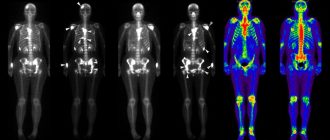Prostate specific antigen (PSA) is a protein substance produced by the prostate and contained in the ejaculate. Its presence in the blood in large quantities is a tumor marker for prostate cancer.
PSA is part of the ejaculate and is necessary for fertilization. However, some of the substance may enter the blood, which will indicate the development of pathological processes in the organ.
What does a PSA test show?
PSA is a tumor marker of the prostate gland, not a specific disease. This is not a universal method that allows you to make a 100% diagnosis. When analyzing it, it is only possible to establish the presence or absence of pathology in the organ. Making an accurate diagnosis requires additional research.
The analysis allows you to obtain several important indicators at once:
- The amount of prostate-specific antigen in the blood.
- Ratio of free PSA to total.
- Density.
- Dynamics of annual changes.
The tumor marker changes not only in the presence of pathologies, but also with age, due to the natural growth of the gland. Values exceeding or falling short of normal will suggest the presence of various pathologies, depending on the indicator, and prescribe additional examinations.
Once in the blood, prostate specific antigen can have one of 3 conditions:
- Free, that is, not have connections with other protein substances.
- Associated with alpha-1-macroglobulin.
- Associated with alpha-2-chymotrypsin.
The ratio of free PSA to total is an equally important criterion and is a tumor marker for prostate cancer. If the values are low, one can assume the presence of an oncological process (BPH or cancer); if the values are elevated, it can be assumed to be chronic prostatitis.
PSA density is the ratio of the amount of substance to the size of the gland. Values exceeding the norm will be the reason for prescribing a prostate biopsy.
It is important to undergo a PSA test annually, this provides an opportunity to study changes in the amount of antigen produced compared to previous levels, which will increase the accuracy of diagnosis.
Reasons for changes in prostate-specific antigen
The reasons that prostate-specific antigen is elevated are:
- the prostate gland is enlarged due to the disease;
- natural increase due to age;
- chronic inflammation;
- oncological processes in the prostate;
- ischemia or infarction of the prostate gland.
A low PSA value also indicates:
- low testosterone production;
- involution or hypotrophy of the prostate.
Rules for conducting and testing prostate-specific antigen
A prostatic tumor marker test involves taking a small amount of blood from a vein. To obtain an accurate result, you must adhere to the rules for preparing and conducting the examination.
Blood donation is scheduled before lunch, because the PSA value fluctuates slightly during the day. The analysis should be carried out on an empty stomach, in addition, you need to follow a dietary diet 2 days before donating blood, do not eat fatty, salty and spicy foods, stop drinking alcohol and coffee.
A few days before blood sampling, you should avoid stress and emotional stress. You should also refrain from physical activity, especially those related to the pelvic area, such as cycling or horseback riding. It is also necessary to monitor your body temperature, avoid visiting saunas and baths, and avoid exposure to hypothermia.
Smoking also affects the test results, so it should be stopped 2 days in advance. If the patient is heavily dependent on nicotine and cannot resist, it is necessary not to smoke at least 2 hours before donating blood.
In addition, you must refrain from sexual intercourse and ejaculation for the next 2-3 days before diagnosis.
The procedure is not prescribed if prostate massage, TRUS, cystoscopy or other procedures affecting the prostate gland have been performed within the next two weeks.
All medications taken and previously prescribed procedures should be discussed with your doctor, because some of them can lead to false positive or false negative results.
Norm values for prostate-specific antigen
The prostate tumor marker normally does not exceed 4 ng/ml.
But, taking into account age-related changes, a table of normal indicators has been compiled depending on age. Table of the norm of total prostate-specific antigen in men by age:
| Age | Normal, ng/ml |
| Up to 40 years old | Up to 2 |
| After 40 years | 2,5 |
| After 50 years | 3,5 |
| After 60 years | 4,5 |
| After 70 years | 6,5 |
Values less than 2 ng/ml are also taken into account, because they indicate involution of prostate function.
The ratio of free PSA to total is also taken into account. Normally, free prostate specific antigen makes up 12-15% of the total. A lower ratio indicates the development of an oncological process. If free prostate specific antigen is elevated, a diagnosis of acute and chronic inflammatory processes will be prescribed.
The norm for PSA density is 0.15 ng/ml/cm³; to calculate it, in addition to blood sampling, an ultrasound is also performed.
If a PSA test is performed regularly, the doctor has the opportunity to compare the dynamics of the increase in tumor marker. Normally, it does not exceed 0.75 ng/ml per year.



